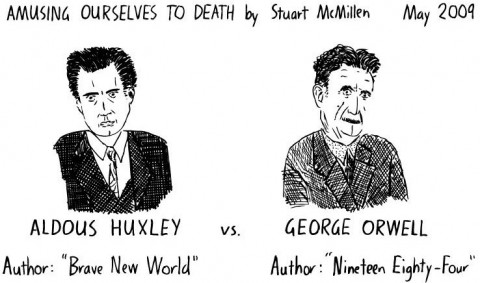December 22, 2009
December 15, 2009
Heart-warming story of the day
Jon sent me this heart-warming story, and I thought it best to share:
A millionaire businessman who fought back against a knife-wielding burglar was jailed for two-and-a-half years yesterday. But his attacker has been spared prison.
Munir Hussain, 53, and his family were tied up and told to lie on the floor by career criminal Waled Salem, who burst into his home with two other masked men.
Mr Hussain escaped and attacked Salem with a metal pole and a cricket bat. But yesterday it was the businessman who was starting a prison sentence for his ‘very violent revenge’.
Jailing him, Judge John Reddihough said some members of the public would think that 56-year-old Salem ‘deserved what happened to him’ and that Mr Hussain ‘should not have been prosecuted’.
But had he spared Mr Hussain jail, the judge said, the ‘rule of law’ would collapse.
He said: ‘If persons were permitted to take the law into their own hands and inflict their own instant and violent punishment on an apprehended offender rather than letting the criminal justice system take its course, then the rule of law and our system of criminal justice, which are hallmarks of a civilised society, would collapse.’
Salem, who has previous convictions, has already been given a non-custodial sentence despite carrying out what the judge called a ‘serious and wicked’ attack.
Well, it’s nice to know that some judges carry the best interests of “society” close to their hearts. And he’s right, you know: society would indeed collapse if the courts were forced to spend their time trying and sentencing career criminals like Salem. They’re career criminals. Custodial sentences would interfere with their careers, which would be a serious infringement of their human rights. Can’t have that.
The courts, however, are well situated to send serious messages to wanton millionaires like Hussain, who need to be regularly reminded that their wealth and privilege does not give them rights over and above those enjoyed by normal non-millionaires. I have no need to remind you that non-millionaires are not allowed to defend themselves against criminals either.
So, clearly, justice is served.
In some parallel universe, anyway.
Jack Ruby rides again
Ezra Levant points out the contrast between media reaction to a silly Tory joke image in 2008 (a puffin pooping on Liberal leader Stephane Dion) and this:
Image from the Liberal Party’s website.
December 10, 2009
Russia does it again, to NATO’s benefit
Sometimes, the Russian approach to diplomacy results in exactly the opposite to the intended outcome:
In the 1990s, when enlarging NATO to take in the ex-communist countries still seemed perilous and impractical, help came from an unexpected source. Yevgeny Primakov, a steely old Soviet spook who became first head of Russia’s Foreign Intelligence Service, then foreign minister and even, briefly, prime minister, liked to say that it would be “impermissible” for the alliance to admit ex-communist states.
His remarks, and others in similar vein by leading Russian politicians, proved counterproductive. The more the Kremlin huffed and puffed about ex-captive nations deciding their own future, the harder it became to dismiss those countries’ fears: if your neighbour terms it “impermissible” for you to install a burglar alarm, people will start taking your security worries seriously. Some wags even suggested that a “Primakov prize” be established to mark the boost he had given to the cause.
But the lesson apparently was not learned:
Instead, Russia is adopting the opposite course. It habitually violates Baltic airspace. It maintains a vocal propaganda offensive (such as a report being launched in Brussels this week by a Russian-backed think-tank, which criticises Baltic language and citizenship laws). This autumn, it scandalised NATO opinion by running two big military exercises, without foreign observers, based on highly threatening scenarios (culminating in a Strategic Rocket Forces drill in which Russia “nuked” Poland). The exercises demonstrated weakness and incompetence, as well as force of numbers and nasty thinking. But they made life hard for peacemongers and strengthened the arguments of NATO hawks and the twitchy eastern Europeans.
December 9, 2009
December 8, 2009
This is what qualifies as “toughened” standards?
An aside in this week’s Tuesday Morning Quarterback column by Gregg Easterbrook caught me completely by surprise. I had no idea that the US housing market was quite this dysfunctional:
As Part of Tough New Standards for Subsidized Mortgages, Home Buyers Will Be Required to Rub Their Heads and Pat Their Stomachs at the Same Time: The Federal Housing Administration underwrites mortgages for people having problems. Before 2008, the FHA supported about 2 percent of the nation’s mortgages, now the number is nearly at 30 percent, which shows how deep the subprime mortgage issue runs and how much taxpayers now subsidize home ownership. Last week, the FHA said it will toughen lending rules. Borrowers will now be required to put up 3.5 percent of the mortgage as cash or gifts from relatives, and there will be a cross-check against the down payment’s appearing to come as a gift from a charity but actually coming from the seller or builder through a middleman disguised as a charity. A generation ago — a decade ago! — home buyers were expected to have a 20 percent down payment; that made them unlikely to try to buy something they could not afford, and banks wouldn’t be exposed if something went wrong, since they were lending only 80 percent of the value of the property. Now requiring 3.5 percent down is viewed as “toughening” standards. Isn’t this an invitation for yet another cycle of mortgage problems?
Absolutely mind-boggling.
December 4, 2009
PayPal detects phishing attempt . . . from PayPal
You know those bogus emails you get pretending to be from PayPal, including poisoned links? If you’re the conscientious type, you forward them on to the anti-phishing folks at PayPal, right? You’ll usually get a response saying something like You’re right, it does look suspicious:
Banks and financial institutions are fond of lecturing customers about the perils of phishing emails, the bogus messages that attempt to trick marks into handing over their login credentials to fraudulent sites. Yet many undo this good work by sending out emails themselves that invite users to click on a link and log into their account rather than going a safer route and telling users to use bookmarked versions of their site.
The problems of the former approach are neatly illustrated by a blog posting by Randy Abrams, a former Microsoft staffer who is now director of technical education at anti-virus firm Eset. Abrams complained about the inclusion of a link in an email from PayPal as it looked rather too much like a phishing email.
I’ve noticed a number of rather more sophisticated phishing attempts in the last couple of weeks, which makes this PayPal error all the more dangerous . . . because it lowers peoples’ wariness about other legitimate-seeming messages.
December 1, 2009
QotD: Nomenclature, 2.0
Paused over lunch to roll through the Deadpool on TechCrunch, reading about expired internet companies. Been a while. Most had to do with “social media,” and most got millions of dollars to produce a novel way where X could connect Y with P using Z, and then: profit! The names of these companies makes me weep:
Zopo, Lefora, Meetro, Ning, Sinopio, CapaZoo, Joox, Foonz.
These are not businesses. These are characters in a pre-school TV show. I have a tough time imagining a hard-nosed venture capitalist saying Well, it’s an interesting idea you have, and on behalf of my group, we’re willing to invest $12 million in Shagafumoo.
James Lileks, Bleat, 2009-12-01
November 30, 2009
2012 Olympic logo not just ugly, but also cartoon porn
One of the least aesthetic Olympic logos ever devised may also be deemed pornographic:
Government zeal in pursuing anyone suspected of harbouring paedophilic tendencies may shortly rebound — with unintended consequences for the 2012 Olympic logo.
Earlier this month, the Coroners & Justice Bill 2009 received the Royal Assent. This Act was another of those portmanteau pieces of legislation for which the current government is famous, mixing up new regulations on the holding of inquests, driving offences, provocation in murder cases and, crucially, a new law making it a criminal offence to be found in possession of an indecent cartoon image of a child.
The horror facing the unpopular Olympics logo is that this is a strict liability offence. If an image is indecent, or held to be so by a jury, it is no good the Olympic Committee claiming that it was not intended as such.
Regular readers will be aware of the controversy that surrounded the current logo since the day it was launched. Critics were not impressed by the £400,000 that had allegedly been shelled out to creative consultancy Wolff Olins to come up with the design. However, it was the logo’s perceived suggestiveness — with many sniggering that it appeared to show Lisa Simpson performing an act of fellatio — that excited internet controversy.
You’ll not that I was careful not to show the offending logo, both for fear of prosecution and because it’s hideous:
[Perry de Havilland]: What does it look like to you? To me it is obvious: a collapsing structure of some sort, perhaps a building at the moment of demolition. The sense of downwards motion towards the bottom of the page is palpable.
Breathtaking. I mean what truly magnificent symbolism. The entire Olympic endeavour has been a massive looting spree with already grotesque cost over-runs (and it is only 2007), so surely something that conjures up images of collapse and disaster is really on the money . . . and speaking of money, at £400,000 (just under $800,000 USD) for the logo, it perfectly sums up the whole ‘Olympic Experience’ for London taxpayers. [. . .]
[James Lileks]: Seriously, what is the matter with people who come up with this? And what is the matter with the people who approved it? Ads that showed the logos have reportedly caused seizures among British epileptics, but I think this thing would make a fossilized femur bone suffer convulsive muscle spasms. If you can’t tell, it’s the year of the London games — 2012. I think it’s also meant to imply a human form — say, a discus thrower, or a runner bursting from the blocks. Whatever it is, it’s an aesthetic catastrophe, and would seem to indicate there’s no one around in the London Games who had the nerve to bark “rubbish, that; try again, and give me a proper logo with some bloody numbers.” I think there’s a point at which people lose the ability to pretend they have any sort of aesthetic criteria, and embrace whatever’s loud and ugly simply because loud and ugly is the style of the times. There’s always a fair amount of coin to be had for dissing the traditionalists, of course; I imagine that if someone submitted a logo with a flag or a bulldog they would have suffered a gentle sneer: still pining for the empire, eh, Smithson. Well, Kipling’s dead. Yes he is. Dig him up, you’ll find Posh Spice’s heel stuck in his heart, the coffin stuffed with I Heart Diana memorial teddy bears.
Doctors urged to advise patients on reducing their carbon butt-print
The Climate and Health Council in Britain is urging GPs to provide their patients with information on how to reduce their carbon output:
The Council has been recently formed to study the health benefits of tackling climate change and promotes a range of ideas from reducing your carbon footprint by driving less and walking more to eating local, less processed food.
It wants to raise ‘health’ on the agenda of December’s UN Climate Change Summit in Copenhagen.
They believe that offering patients advice on how to lower their carbon footprint can be just as easy and achievable as helping them to stop smoking or eat a healthier diet.
Other proposals include for all developed nations to pay an extra five dollars a barrel on oil and a tax on airline tickets. This would go into a special fund to develop low-carbon alternatives to existing technologies, they say.
So, after waiting for however many weeks to get that precious 2.5 minutes of actual patient-doctor interaction, two minutes will now be composed (in a Freudian slip, I originally mistyped that as “composted”) of Climate-Puritan hectoring. That’ll do wonders for both the environment and for doctor/patient relations.
November 26, 2009
Red flag checklist
The recent Climate Change/AGW revelations (which the Climate Czar is still assuring people won’t actually change anything) are of great interest to climate skeptics, but the systematic perversion of the normal scientific methods shows how easy it has been for a particular viewpoint to be lauded as the consensus. Here is a list of suspicious behaviour which could be red flags for scientists trying to circumvent normal checks and balances:
(1) Consistent use of ad hominem attacks toward those challenging their positions.
(2) Refusal to make data public. This has been going on in this area for some time.
(3) Refusal to engage in discussions of the actual science, on the
assumption that it is too complicated for others to understand.(4) Challenging the credentials of those challenging the consensus position.
(5) Refusal to make computer code being used to analyze the data public. This has been particularly egregious here, and clear statements of the mathematics and statistics being employed would have allowed the conclusions to be challenged at a much earlier stage.
November 23, 2009
Digital Economy Bill should be called Digital Disenfranchisement Bill
The proposed British legislation called the “Digital Economy Bill” is going to be very bad news, says Charles Stross:
I’m a self-employed media professional working in the entertainment industry, who earns his living by creating intellectual property and licensing it to publishers. You might think I’d be one of the beneficiaries of this proposed law: but you’d be dead wrong. This is going to cripple the long tail of the creative sector — it plays entirely to the interests of large corporate media organizations and shits on the plate of us ordinary working artists.
Want to write a casual game for the iPhone and sell it for 99 pence? Good luck with that — first you’ll have to cough up £50,000 to get it certified as child-friendly by the BBFC. (It’s not clear whether this applies to Open Source games projects, but I’m not optimistic that it doesn’t.)
Want to publish a piece of shareware over BitTorrent? You’re fucked, mate: all it takes is a malicious accusation and your ISP (who are required to snitch on p2p users on pain of heavy fines) will be ordered to cut off the internet connection to you and everyone else in your household. (A really draconian punishment in an age where it’s increasingly normal to conduct business correspondence via email and to manage bank accounts and gas or electricity bills or tax returns via the web.) Oh, you don’t get the right to confront your accuser in court, either: this is merely an administrative process, no lawyers involved. It’s unlikely that p2p access will survive this bill in any form — even for innocent purposes (distributing Linux .iso images, for example).
As I’ve said before, we’re rapidly moving to a world where it will be difficult to have a normal life without network access . . . this bill will create a new underclass of non-persons, all to benefit the dinosaurs of the media conglomerates. And introduced by a _Labour_ government, no less.
We are already at the point where it is a reasonable and sensible thing to say that access to the internet is a human right (at least in the west). Mandelson’s three strikes provision will deny innocent people access to the internet (for all it will take is accusations that do not need to have proof), which for more and more people will be the practical equivalent of being exiled from the country. No internet access would mean children can’t get access to school work, parents can’t get access to their bank accounts, and everyone will be cut off from large parts of their social circle (more and more people depend on email, Twitter, Facebook, and other social media to stay in touch).
Due process? That seems to have been lost in the rush. Proportionality? That’s been gone for years.
November 16, 2009
Orwell vs. Huxley
Victor sent me this link with the cryptic comment “Oh shit”:
November 13, 2009
Veterans chase would-be robber out of Legion
A Royal Canadian Legion branch was the target of an armed robbery. The would-be robber must have thought these old gaffers would be easy pickings, as he walked in while they were counting the cash from this year’s poppy drive. He was lucky to escape:
A would-be thief brandishing a gun likely wasn’t counting on an 84-year-old veteran and a fellow member of his Toronto legion putting up a fight when he tried to make off with their poppy money.
But police say that’s what happened Thursday when a man walked into a Royal Canadian Legion in the city’s east end as members were counting the money from this year’s poppy drive.
They refused to give up the cash and instead chased the suspect and tackled him.
However, they were unable to stop him from getting away.
John Dietsch, the 84-year-old Second World War veteran, says he thought of the veterans who served in the military – and the time they spent selling poppies – when he stood up to the man.






